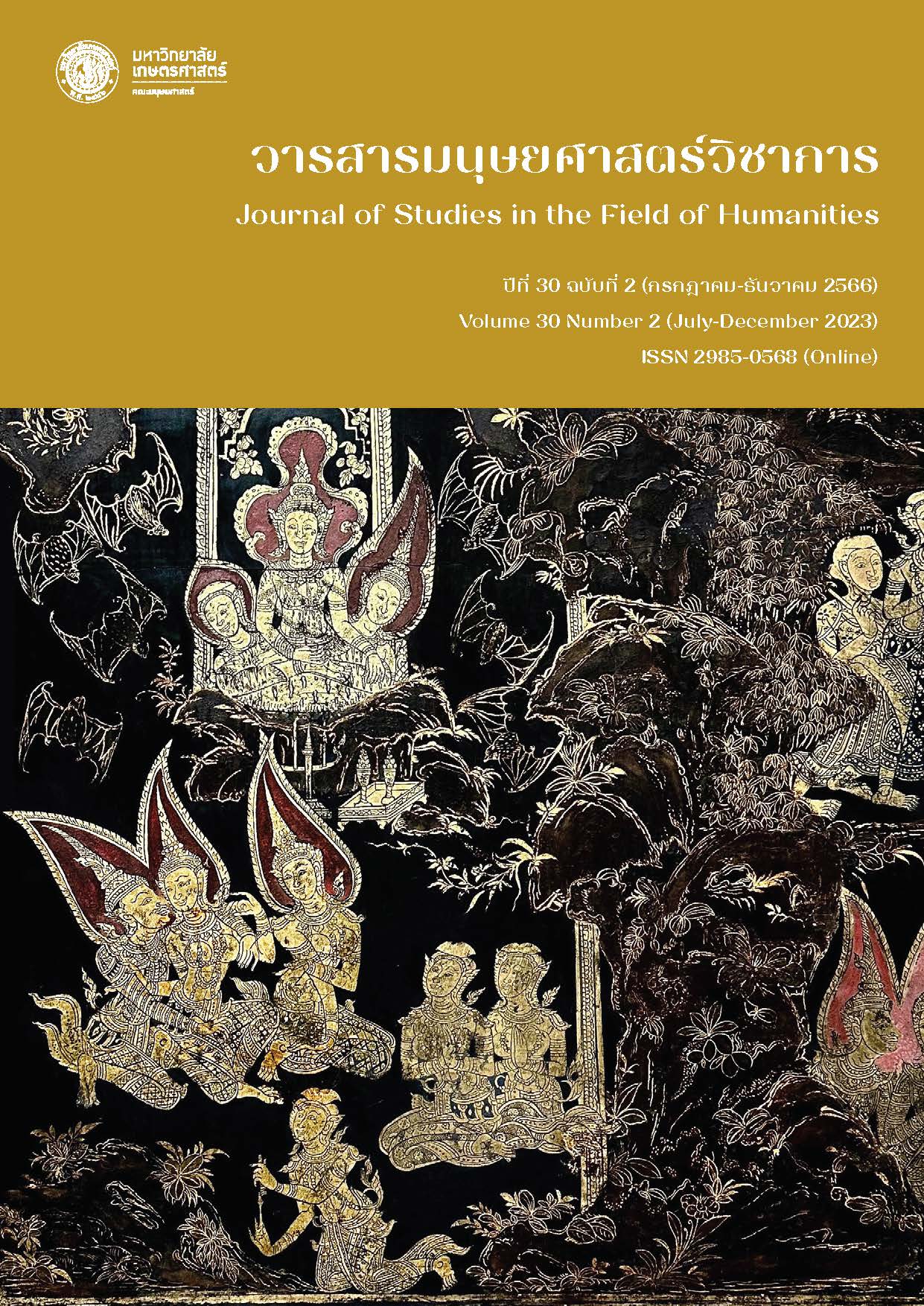Mitigating Expressions in Thai Discourse
Main Article Content
Abstract
Mitigation plays a very important role in communication because it enhances the reduction of negative effects which utterances have on speakers and hearers (Fraser, 1980). Previous studies suggest that mitigation has been examined in several languages; however, little has been investigated in Thai. Accordingly, this paper aims at investigating mitigating expressions in Thai. The data consists of 4 types of discourse: task-based conversations, interactions in academic seminar, academic articles, and opinion articles. The notion of mitigation is adopted as an analytical framework. The results reveal that there are 8 types of mitigating expressions used by Thai speakers, namely 1) epistemic expressions, 2) non-specific remarks, 3) parenthetical verbs, 4) question forms used for proposing opinions, 5) defensive expressions, 6) hypothetical remarks, 7) disclaimers, and 8) hesitant remarks. The most preferred mitigating expression is epistemic expressions. This linguistic behavior seems to be related to Thai norms which give precedence to humility and interpersonal relations. In addition, the result also shows that Thai speakers usually adopt only one form of mitigating remarks. It is hypothesized that this might be because using only one mitigating remark is enough to reduce negative effects of utterances in Thai. On the contrary, using a few mitigating remarks together might reduce the reliability of the speaker’s utterances.
Article Details

This work is licensed under a Creative Commons Attribution-NonCommercial-NoDerivatives 4.0 International License.
References
ณัฐพร พานโพธิ์ทอง และศิริพร ภักดีผาสุข. (2561). การสนทนาแบบเน้นภารกิจในภาษาไทยกับปัจจัยทางสังคมวัฒนธรรมที่เกี่ยวข้อง: กรณีศึกษาข้อมูลชุด Mister O ภาษาไทย. ภาษาและภาษาศาสตร์, 36, 1-30.
นิจจาภา วงษ์กระจ่าง. (2545). กลวิธีการรักษาหน้าในการตอบคำถามของนักการเมืองไทย (วิทยานิพนธ์มหาบัณฑิต สาขาวิชาภาษาศาสตร์). จุฬาลงกรณ์มหาวิทยาลัย, กรุงเทพฯ.
พรนภัส ทองพูล. (2559). รูปเบี่ยงบังและหน้าที่ในแผ่นพับโฆษณาผลิตภัณฑ์เสริมอาหารลดน้ำหนัก (วิทยานิพนธ์มหาบัณฑิต สาขาวิชาภาษาไทย). มหาวิทยาลัยธรรมศาสตร์, กรุงเทพฯ.
รดารัตน์ ศรีพันธ์วรสกุล. (2562). การศึกษาวัจนกรรมการแสดงความเห็นแย้งของผู้เรียนภาษาไทยชาวจีนตามแนววัจนปฏิบัติศาสตร์อันตรภาษา: กรณีศึกษานักศึกษาชาวจีนจากมณฑลยูนนานและกวางสี (วิทยานิพนธ์มหาบัณฑิต สาขาวิชาภาษาไทย). จุฬาลงกรณ์มหาวิทยาลัย, กรุงเทพฯ.
วรวรรณา เพ็ชรกิจ และคณะ. (2559). รูปเบี่ยงบังระดับคำและหน้าที่ในบทความวิจัยภาษาไทยด้านวิทยาศาสตร์และมนุษยศาสตร์. วารสารศิลปศาสตร์ มหาวิทยาลัยธรรมศาสตร์, 16(2), 173-198.
วราภรณ์ สุขประเสริฐ. (2533). กลวิธีทางภาษาในการกลบเกลื่อนความคิดทางลบต่อมารดาในทัศนปริจเฉทของวัยรุ่น (วิทยานิพนธ์มหาบัณฑิต สาขาวิชาภาษาไทย). จุฬาลงกรณ์มหาวิทยาลัย, กรุงเทพฯ.
สิทธิธรรม อ่องวุฒิวัฒน์. (2558). การแสดงความเห็นแย้งในปริจเฉทการสนทนาในภาษาไทยและข้อคำนึงที่เป็นเหตุจูงใจ (วิทยานิพนธ์ดุษฎีบัณฑิต สาขาวิชาภาษาไทย). จุฬาลงกรณ์มหาวิทยาลัย, กรุงเทพฯ.
สุนันทา คงประโคน. (2544). กลวิธีการกลบเกลื่อนในการสนทนาเรื่องเพศของคนไทย (วิทยานิพนธ์มหาบัณฑิต สาขาวิชาภาษาไทย). จุฬาลงกรณ์มหาวิทยาลัย, กรุงเทพฯ.
อมรา ประสิทธิ์รัฐสินธุ์. (2557). ลักษณะสองหน้าของภาษาวิชาการ: ความแจ่มชัดและการเบี่ยงบังในการเขียนภาษาวิชาการไทย. ใน ภาษากับอำนาจ: บทความจากการประชุมวิชาการ, (น. 78-107). กรุงเทพฯ: สำนักงานกองทุนสนับสนุนการวิจัย.
อรวี บุนนาค และสมชาย สำเนียงงาม. (2561). กลวิธีการกลบเกลื่อนในการสื่อสารในภาวะวิกฤตผ่านเฟซบุ๊กองค์กรธุรกิจ. วรรณวิทัศน์, 18, 138-165.
Brown, P., & Levinson, S. (1987). Politeness: Some Universals in Language Usage. Cambridge: Cambridge University Press.
Caffi, C. (1999). On mitigation. Journal of Pragmatics, 31, 881-909.
Crompton, P. (1997). Hedging in academic writing: Some theoretical problems. English for Specific Purposes, 16(4), 271-287.
Flores-Ferrán, N. (2010). An examination of mitigation strategies used in Spanish psychotherapeutic discourse. Journal of Pragmatics, 42, 1964-1981.
Fraser, B. (1980). Conversational mitigation. Journal of Pragmatics, 4, 341-350.
Fujii, Y. (2012). Differences of situating Self in the place/ba of interactional between the Japanese and American English speakers. Journal of Pragmatics, 44, 636-662.
Grice, H. P. (1975). Logic and Conversation. In P. Cole & J. L. Morgan (Eds.), Syntax and Semantics, Vol.3: Speech acts. New York: Academic Press.
Henricson, S. & Nelson, M. (2017). Giving and receiving advice in higher education. Comparing Sweden-Swedish and Finland-Swedish supervision meetings. Journal of Pragmatics, 109, 105-120.
Holmes, J. (1984). Modifying illocutionary force. Journal of Pragmatics, 8, 345-365.
Hübler, A. (1981). Understatements and Hedges in English. Amsterdam: John Benjamins Publishing Company.
Hurford, J. R. & Heasley, B. (1990). Semantics: a coursebook. Cambridge: Cambridge University Press.
Hyland, K. (1994). Hedging in academic writing and EAP textbooks. English for Specific Purposes, 13(3), 239-256.
Itakura, H. & Tsui, A. B. M. (2011). Evaluation in academic discourse: Managing criticism in Japanese and English book reviews. Journal of Pragmatics, 43, 1366-1379.
Lakoff, G. (1973). Hedges: A study in meaning criteria and the logic of fuzzy concepts. Journal of Philosophical Logic, 2, 458-508.
Locher, M. A. & Watts, R. J. (2008). Relational work and impoliteness: Negotiating norms of linguistic behaviour. In D. Bousfield & M. A. Locher (Eds.), Impoliteness in Language. Studies on its Interplay with Power in Theory and Practice (pp. 77-99). Berlin: Mouton de Gruyter.
Markus, H. R., & Kitayama, S. (1991). Culture and the self: Implications for cognition, emotion, and motivation. Psychological Review, 98(2), 224-253.
Schneider, S. (2010). Mitigation. In M. A. Locher & S. L. Graham (Eds.), Interpersonal Pragmatics (pp. 253-269). Berlin: Mouton de Gruyter.
Shisá, M. (2001). Illocutionary force and degrees of strength in language use. Journal of Pragmatics, 33, 1791-1814.
Spencer-Oatey, H. (2000). Managing rapport in talk: Using rapport sensitive incidents to explore the motivational concerns underlying the management of relations. Journal of Pragmatics, 34, 529-545.
Thaler, V. (2012). Mitigation as modification of illocutionary force. Journal of Pragmatics, 44, 907-919.
Wang, Y. (2019). A mitigator or intensifier? A study of non-epistemic uses of English “I think,” Japanese “to omou” and Chinese “wo juede” [Poster presentation]. The 16th International Pragmatic Conference, Hong Kong.


